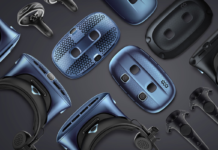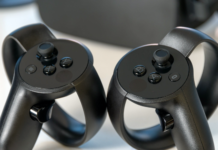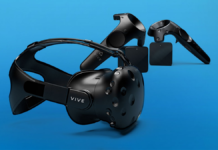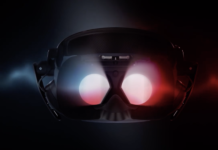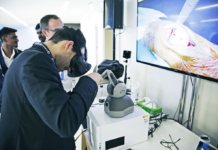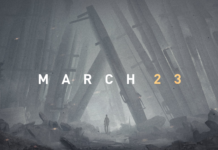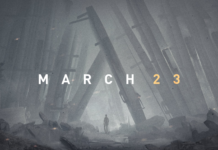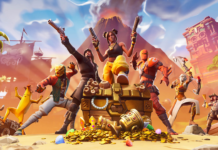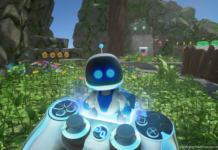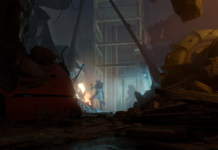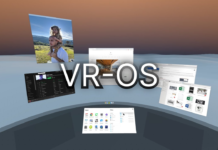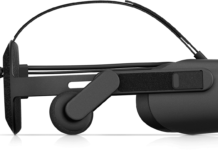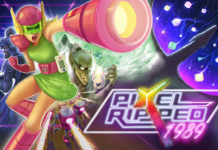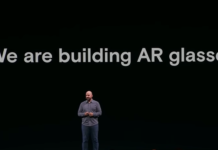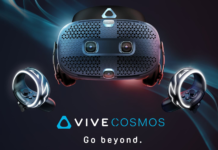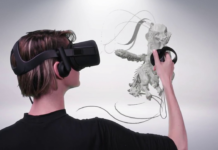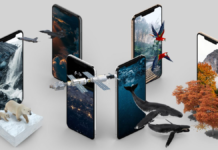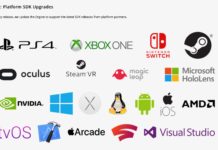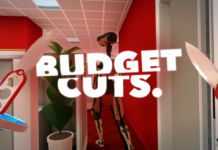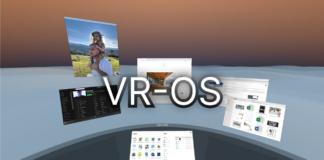There have been plenty of games made that try to emulate the success that Beat Saber has had, but only a few have had even minor success. Synth Riders is one of the few games that has captured the audience in a way that Beat Saber has, using rhythm and rails to guide you along in your journey to perfecting your 1980’s dream song.
Oculus sat down with the Creative Director of Kluge Interactive, Abraham Aguero and asked him a few questions about the game. They also asked Lead developer Jhean Ceballos and CEO Arturo Perez a few questions as well. You can check out the entire set of questions below.
What was the inspiration behind Synth Riders? How has the game changed over time?
Abraham Aguero: I’m a big fan of rhythm games like Thumper and Dance Dance Revolution. I knew I wanted to make a game that combined these mechanics and brought them into VR. At the same time, I was obsessed with the nostalgic feel of the ’80s and the simplicity of early game classics like Space Invaders. All of this combined created the original Synth Riders.
As we released it to the VR community last year, they expanded it beyond our wildest imagination. They pushed us to make the game more challenging, and the visual and musical world we created continues to expand well beyond the ’80s. We’re constantly thinking of ways to evolve it now that it’s no longer just our game.

Tell us about your studio. How did you get your start working in VR?
Arturo Perez: Synth Riders was incubated in a boutique design studio, Kluge Interactive. Based in Los Angeles, Kluge is a team of 15 cross-disciplined designers and developers; we’ve been servicing clients for the last 12 years, but we’ve always talked about building our own products. We’re proud to say Synth Riders is our first product. It’s all due to Abraham’s obsession with VR and his insane ability to stay focused on it, in spite of all sorts of distractions constantly going on with the service side of our business.
AA: When VR came out, I fell in love with the medium and instantly wanted to dive in. My first take on it was Atmosferas, a reinterpretation of my mother’s artwork. It created a very unique environment that took the viewer on a very spacey ride, but I wanted to go further and build something that a user could interact with. Around this time I began building Retrowave VR on Instagram, a community of synthwave and ’80s video game enthusiasts. Through Retrowave VR, I realized the huge interest there was in this style of music and aesthetic.
What sets Synth Riders apart from other VR rhythm games?
Jhean Ceballos: The great range of movement and how great it makes you feel to ride a long note “rail”—the beat maps are hand-crafted in a way that encourages players to dance.
AP: Abraham is our Creative Director, and he comes from a family of artists, which is evident in the stunning visual landscapes he created for Synth Riders. The different stages and visual environments give the game a unique energy that allows you to immerse yourself further into the music.
AA: Many people ask us how Synth Riders is different from other games. Having demoed it to hundreds of people, all I can say is try the game to see for yourself. Synth Riders is unique in that it is part action, part dance, and part rhythm. It’s really something that you have to experience for yourself.

How long has the game been in development? Any favorite anecdotes you’d like to share?
JC: We’ve been working on it for a little more than two years. Since I was working on it from Panama, for a long time I was developing Synth Riders without a VR device. My PC at the time wasn’t VR-ready, so I just had to code imagining how the results would be in a VR environment.
What kind of response have you seen since launching the game?
AA: The community behind the game is really the best. We can’t thank them enough for the support they give to Synth Riders. One huge reaction from the community was how they joined forces when it came to shooting our promotional video. It was originally shot in Australia with multiple streamers from our community getting together from different locations to make it happen.
What we’ve lacked in gaming experience, we’ve more than made up for thanks to our community.
They’ve also been instrumental in completing the game on time for our release on Quest. We wanted to make sure that the full release included a nice range of music, including two new music packs that came together in the very final weeks. Our community of mappers and testers jumped in to help build out and test all of the final eight maps within an extremely tight timeframe that meant long weekend hours. We can’t thank them enough for their efforts and enthusiasm. It’s truly been a global effort.
Any memorable demo reactions?
AP: The game has brought a smile to many people’s faces, and we always get a huge rush of energy from demoing it and getting people’s feedback.
In fact, I just came back from Argentina where I shared my Oculus Quest with my sister. She’s a dancer, and her friends just took to the game so much. I was there for her birthday, which ended with an official Synth Riders competition for points and style. Her friends were lining up at her house days ahead to practice for the competition. It’s surreal moments like that that make us feel we’re onto something exciting.

Who did you work with on the soundtrack and sound design? What was that experience like?
AP: In addition to being a designer, Abraham was actually a trance and techno DJ back in our hometown in Venezuela. That’s where he got his nickname, “Aben” (DJ Aben), and it’s why it makes so much sense that he leaned so heavily towards music when he started Synth Riders.
Prior to being a design studio, Kluge actually started as a music magazine. Abraham and I first bonded over music, and it makes a lot of sense that our first product is intimately tied to music.
AA: Music and sound are vitally important for our game, and we are very fortunate to have the support of some very innovative and forward-thinking labels and artists. A huge supporter has been Synthwave standout Celldweller aka Klayton and the label that he founded, FiXT music. We currently have 10 FiXT music tracks in Synth Riders, and their label has been tremendously supportive of the game. In fact, Celldweller agreed to give us an exclusive Synth Riders version of his latest single, “Into The Void.” The single is going to be released to the public on November 8, but the exclusive Synth Riders track is available with our Quest launch, which is a huge honor for us.
In regards to the sound design, we used our go-to sound engineer, Matias Monteagudo, who is actually my cousin. Kluge has been working with Matias for years. He does a great job bringing interactions to life. In VR you have haptics, which allows you to take the interactions a step further. This is something we’ve really enjoyed experimenting with and want to do more of.

What’s your favorite part of the game and why?
JC: Riding the rails! Really, there’s nothing else like it.
AP: I love the game’s overall energy. It’s something you just have to experience. We can’t describe it. A lot of love went into the game, from the artistic details of Abraham to all of the details that came from our community. And you can feel it when you play it.
What advice would you give to a developer looking to start building for VR?
JC: Don’t be afraid and just do it. As I said, I didn’t have a headset for most of the game development, but that didn’t stop me. The feeling of completing the game and seeing the enjoyment of the users while playing it makes all the effort worth it.
What’s next for you? Any exciting updates in the works?
AA: We have some exciting developments regarding multiplayer and achievements that we hope will be coming out soon. We also have some ideas about ways to make the game even more challenging and exciting. We can’t wait to share them with the community!


